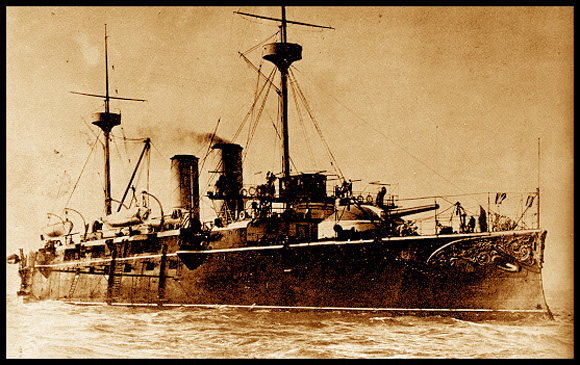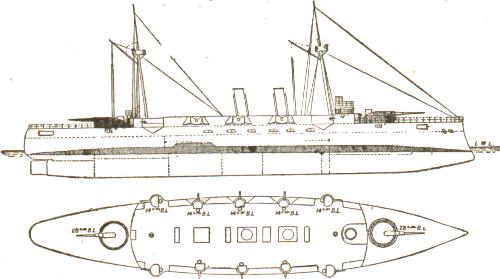
VIZCAYA
By Patrick McSherry

Other views of the VIZCAYA:
Stern view after the battle
||| Broadside view after battle showing bow
damage ||| chart of hits |||
Shell fired by Vizcaya
at Manila Bay
GENERAL:
The Cruiser VIZCAYA was one of the prides of the Spanish Fleet. Part
of Admiral Cervera's Squadron, she was trapped
at Santiago de Cuba by the blockading US Fleet of Sampson and Schley
and destroyed when the Spanish ships sortied on July 3, 1898.
BACKGROUND:
VIZCAYA was sent to New York early in 1898 to reciprocate the "friendly"
visit of USS MAINE to Havana. After the destruction
of the MAINE, she returned to Spain and was attached to Admiral Cervera's
fleet. Very soon VIZCAYA was again crossing the Atlantic for what would
prove to be the last time. Blockaded at Santiago de Cuba with the rest
of Cervera's force, VIZCAYA was the second ship to sortie from the harbor
on July 3, 1898. Suffering from heavy American fire during the Battle
of Santiago, Captain Don Antonio Eulate ran VIZCAYA on the rocks about
18 miles from the harbor entrance and surrendered, in order to save the
lives of his crew. When the wounded Eulate was brought aboard the USS
IOWA, he glanced over at his blazing command, raised his hand in salute
and said "Adios, Vizcaya". As if on cue, the cruiser's forward magazine
exploded as the words left his lips. When the US Navy surveyed the wrecks
of the Spanish fleet after the war, VIZCAYA was declared a total loss.
ADVANTAGES/DISADVANTAGES:
The VIZCAYA was a modern and speedy first class Cruiser. However, the
level of training and maintenance in the Spanish fleet was not what it
should have been, and the VIZCAYA, like all of Cervara's ships, went to
war at less than full efficiency. She was in severe need of drydocking,
her foul bottom greatly reducing her speed and increasing her coal usage.
She was short of ammunition and some of her guns were not operatable. Also,
like all warships of the era, she was heavily decorated and furnished with
wood. The US Navy stripped this flammable material off its vessels at the
beginning of the conflict, but the Spanish failed to do so, making the
VIZCAYA and her fleet-mates seriously susceptible to fire.
TECHNOTES:

| Classification: |
|
Cruiser (Intermediate type between armored and protected, |
|
|
secondary guns and other vital parts had no armor.) |
| Laid down: |
|
1889 |
| Launched: |
|
1891 |
| Completed: |
|
1893 |
| Rig: |
|
Two military masts |
| Armament: |
|
Two 28 cm Hontoria guns (11 inch) |
|
|
Ten 14 cm Hontoria QF guns (5.5 inch) |
|
|
Eight 57 mm Hotchkiss QF guns (3 inch?) |
|
|
Eight 37 mm revolving Hotchkiss guns (1.65 inch) |
|
|
Two 22 mm Nordenfelt machine guns |
|
|
Two 2.75 inch bronze guns (for landing parties?) |
|
|
Eight tordedo tubes |
| Contractor: |
|
Sociedad Astilleros del Nervión of Sestao, |
|
|
supported by Brown of Sheffield (UK). |
| Length: |
|
366 feet, 8 inches (111.8 meters) |
| Beam: |
|
65 feet (19.81 meters) |
| Mean draft: |
|
21 feet, 6 inches (6.55 meters) |
| Displacement: |
|
6,890 tons |
| Complement: |
|
497 Officers and Men, under the command |
|
|
of Captain Don Antonio Eulate. |
| Engine type: |
|
13,700 hp. engines, twin screws. |
| Speed: |
|
20.25 knots |
| Coal bunker capacity: |
|
1,050 tons |
| Coal endurance @ 10 knots: |
|
9,700 miles |
| Armor: |
|
305 mm (10 -12 inch) steel compound side belt, |
|
|
250 mm (9.8 inch) barbettes, 50 mm (2 inch) deck. |
Bibliography:
(As a service to our readers, clicking on title in red
will take you to that book on Amazon.com)
Azoy, A.C.M., Signal 250! The Sea Fight Off Santiago, (New York:
David McKay Company, 1964).
Blow, Michael, A
Ship to Remember , (New York: William Morrow and Company, Inc.,
1992)
Brown, Charles H., The Correspondent's War. (New York: Charles
Scribner's Sons, 1967).
Clerk of Joint Committee on Printing, The Abridgement of Message
from the President of the United States to the Two Houses of Congress.
Washington: Government Printing Office, 1899. Vols. 2, 4.
Crabtree, HJ. B., The pasing of Spain and the Ascendency of America.
(Springfield: The King-Richardson Pusblishing Co., 1898), p.346.
Freidel, Frank, The Splendid Little War" (Boston: Little,
Brown and Company, 1958).
González López, Manuel P., Personal Internet Contact.






